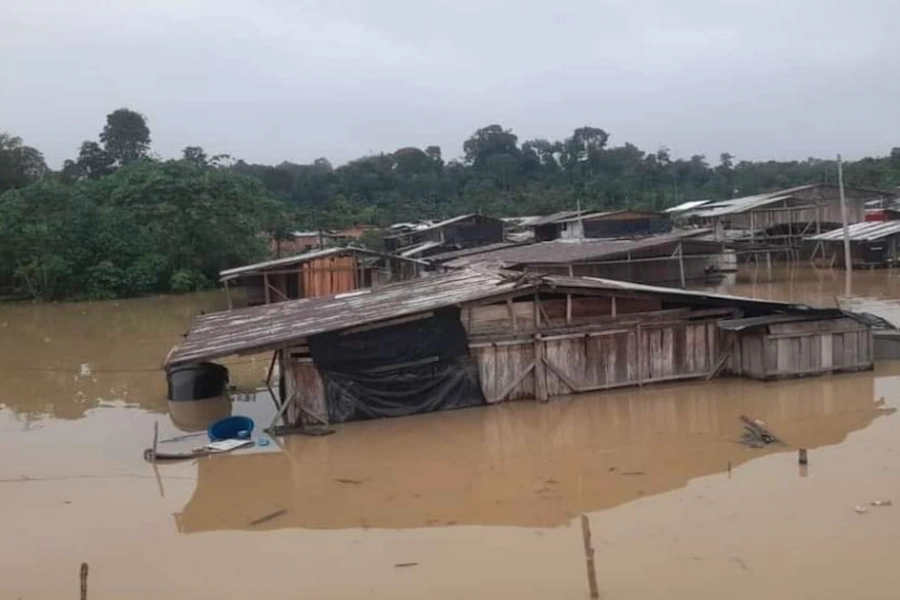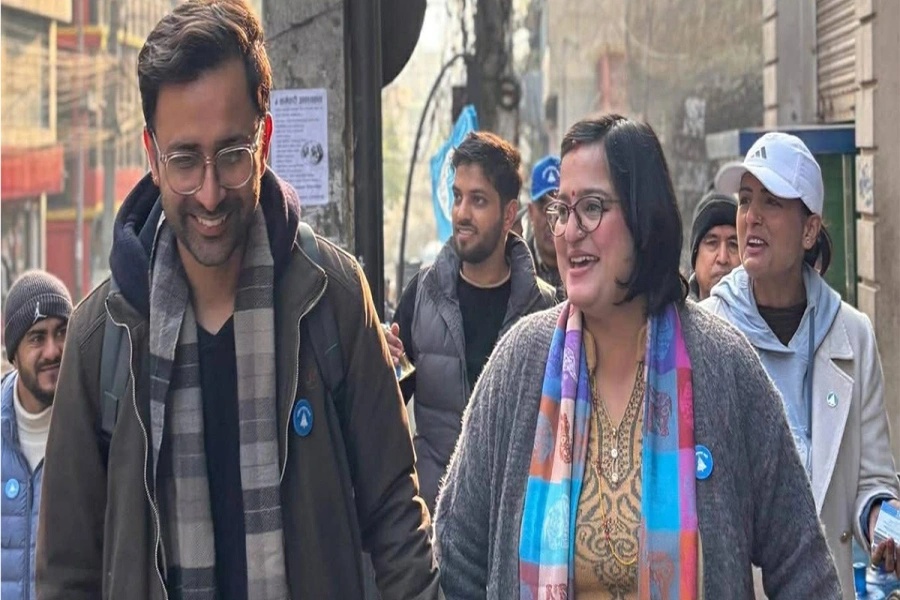Aarti didi couldn’t sleep that night. Her joints had been aching since evening, and after dinner it had gotten worse. Mother sat by her bed, doing her best to ease the pain with mustard oil. “Why has God given all pains of the world to you,” mother could be heard mumbling, amid the traditional songs she kept singing in her soothing, hypnotic voice. I gave company to my mother for sometime but, as the sight of Aarti didi writhing and groaning in agony became too unbearable for me, I returned to my bedroom after, of course, slapping my favorite goat, who had been drowsing in the shed on its enormous belly, its legs stretched on one side.
Lying in bed I concentrated on the sound that flowed in through the walls of didi’s room. Curiously enough, nothing could be made out except the distant trickle of water which one hears in villages hours after the rain has stopped. What was surprising is that it had not rained for weeks. Anyways, hoping that soon things would get better I tried to fall asleep. After all, it had already been half-past ten, and I was in the habit of going to bed immediately after nine.
I couldn’t tell whether I was dreaming, for when the startled voice of mother reached me I found myself already standing by her. I didn’t at all remember going out of bed after throwing away the sheet with which I had covered my body before going to sleep. Even now when I contemplate this, the uncanny elements associated with this fills me with confusing awe. Had I woken up before mother stormed through the hallway of the house, shouting, “It’s gonna rain hell tomorrow! It’s gonna rain hell tomorrow!” The walls of the house were reverberating with her voice.
“When is your father waking!” mother said, looking at me, and at the same time rushing into the room where father was snoring. “This man sleeps dead,” she shouted, shaking his arm. “Don’t you hear me?”
Father, who had emptied a bottle of rum as usual before going to bed, sat up sluggishly, his arms crossed, and looked at us as if we were phantoms in his dream. For a while he didn’t speak and then, clearing his throat, he drawled in that thick, slurry voice, “But what happened, is Aarti still not fine?”
“Had I known you'd make such a hopeless husband, I would never have married you,” mother retorted, trembling with rage. “Gonna rain hell in the morning. Go upstairs and secure the things in the room before rain soaks them useless.”
Rain

While father washed his face, I went into Aarti didi’s room. It was so quiet that I felt I had entered a world that had come into existence only a moment ago. Aarti didi was curled up in a corner and, from the convulsions of her shoulders I could tell she was going through a terrible agony. I stood there in silence, looking at her. “Go, and help your dad,” mother said, sitting beside didi. “Make sure the sparrows don’t entice you into jumping off the roof.”
“At night there will be no sparrows, mai,” I said, standing in the doorway. I was waiting for her to say something, but she gestured with her arms to leave.
In the hall I could hear the jingle of the neck bells of those foolish goats. Mother’s outburst had awoken them too. They were probably standing with their terrified eyes fixed at the door, as if waiting for someone to storm in and snatch the sacs of grasses away. What else can these goats think about? I could even imagine that chubby greyish goat, who had patches of white on its belly, stupidly staring at other goats, a strand of grass sticking between its hairy lips which it slowly nibbled bit by bit. That’s what it did whenever it was stressed. Of course, I was tempted to enter the shed, terrify them, then twist the ears of some of those greedy ones who always sunk their horns in the bellies of weak goats, and then only go upstairs. But mother’s omnipresent voice changed my mind, “Leave the goats alone.”
On the roof there was a chaos of clothes, furniture, rice and grain sacs lying in the open. Due to the upcoming festivals our family, like any other families in the village, was cleaning the entire house to make everything ready for the auspicious occasion. Of course, I had not realized then, but later, especially after the downpour of the following morning, I was to understand that Aarti didi’s pain was mysteriously intertwined with the rain. That whenever she suffered through the torments of arthritic agony it was always, without an exception, that it rained. I had not known this connection at the time I sweated with my father to carry the things inside, and in fact, given that the sky was so clear, I doubted if it would rain the next morning. However, now looking back, I find it totally incomprehensible that mother should have informed us about the downpour of the following morning only after midnight. Of course, she had known about the rain the moment of the onset of didi’s pain. Well, she might have had her own reasons.
Anyways, there was no way one could tell it would rain. There was not a scratch of clouds anywhere till miles and miles away. Even the weather forecast had been mute on this. In fact, immediately after finishing off the work and returning to my room I double-checked to see if any website showed any hints of the possible rain but found none.
I lay in bed, trying to comfort my exhausted body. Hours later I woke to the formidable uproar of a catastrophic downpour. The whole of the house, it seemed, would come crashing down under the raging weight of the rain. I swayed out of the room. The hallway was overflowing with water. Mother and father were carrying buckets of water from there, to ensure that the current didn’t find its way into the rooms. I felt a choking impulse to see how Aarti didi was doing, but her room was locked with a huge padlock. Only later I was to remember, while looking back on everything, that whenever it rained mother used to lock didi to prevent her from interacting with the rain.
Then, I was completely oblivious to all this. Mother had the key knotted in her saree, which in itself should have been sufficient to make me understand that there was a reason, though unknown to me, but relevant in any case, for locking didi in the room. I also began to help in draining water out of the hallway. A little later mother, who now had to go to the shed, to drain water from there, took off her bangles and anklets. “Wait,” she said, giving them to me. “Wait, take these keys too. I don’t want to lose them.” Then, stepping into the shed, she added, “Keep them on daraz, and help dad with the water.”
I obeyed, but with keys now in hand, I couldn’t resist the temptation to enter didi’s room. I pretended to help father for some time. When I noticed that he was smoking cigarette in the verandah, I unlocked the door and went in that room. A burst of incense smoke overwhelmed me. With some effort I found that Aarti didi was at the foot of the bed, her arms and legs tied. She sat there gloomily, watching me with her rain-tormented eyes. She didn’t speak but I felt I heard something. My legs carried me closer to her, and even before I realized I found myself undoing the rope that had tied her arms and legs. She rose, pale as clouds, and kissed me on forehead which felt so calming and hypnotic that I don’t remember, even up to this day, what happened next.
I found myself waking to the thunderous rage of my mother. “You unlocked her,” she shouted angrily, tears in her eyes. “You unlocked her in this terrible train. Everything is lost now.” That was when I sensed, at least my heart did, that Aarti didi was gone forever.
Even now I don’t know what I did was wrong or right. Of course, I had no knowledge of her past, after all I was born nine years after her. So most of her childhood oddities had been kept secret from me, as it was from everyone else. Only after Aarti didi disappeared in the rain did I find that even at the age of three she had managed to slip out into the monsoon downpour. The whole family had been in terror for hours. It was a farmer who brought her to the house. He had found her in the distant field, sitting alone in water and singing some mysterious lullaby to the rain. The farmer, who had brought her, died few days later.
Fortunately, nobody except mother, had understood the connection between the farmer’s death and Aarti didi. After that incident, mother made sure the villagers remained completely shielded from didi’s mysterious tendencies. Monsoon was the toughest season, for almost every day she was in agony. Winter was calmer, and that was when I got to know my sister. In winter we would sit by the fire, and she would share her experiences from another life. She would say she was a nightingale in her previous incarnation and how she liked singing among the flowers of gulmoher tree. Sometimes she would talk about rain, but with immense restrain, as if she were talking about her secret lover. Whenever I fell sick, she would remain all night by my side, soothing me with her warm fingers. But those good moments were short, for winter barely lasted three months, and sometimes even in winters rain would come to haunt her.
Sometimes I feel whatever happened that rainy morning happened for good. But then, even before the feeling has completely sunk in, another takes over, and I’m overwhelmed with irremediable remorse. To be honest, I still don’t know what I did that morning was right or wrong. I don’t even know if I did it intentionally or if it just happened under the influence of forces barely in my control. What I know for certain, however, is that I miss my Aarti didi.
Whenever it rains, I sit alone by the window and watch the world fade as the slanting chords of rain take over the space. I listen intently to the sound, hoping that amid the incoherent, incomprehensible splatter I might make out that distinct, musical voice of my Aarti didi.




































